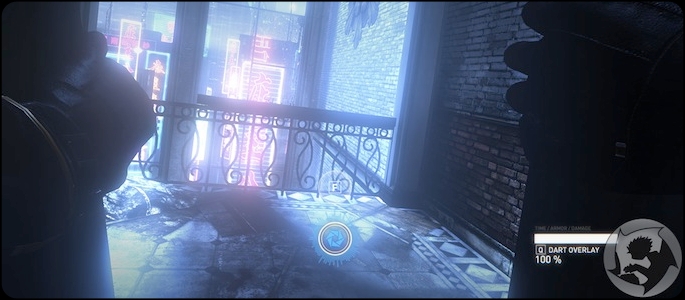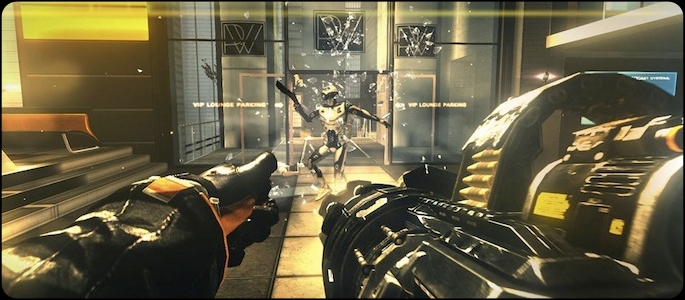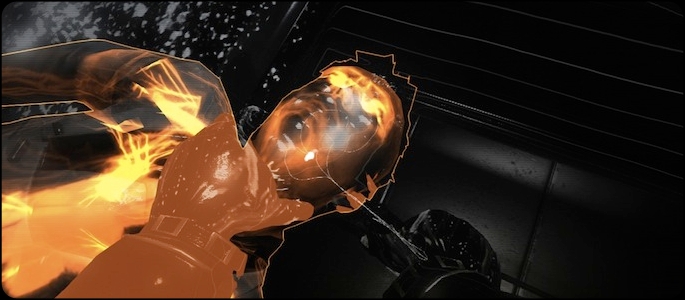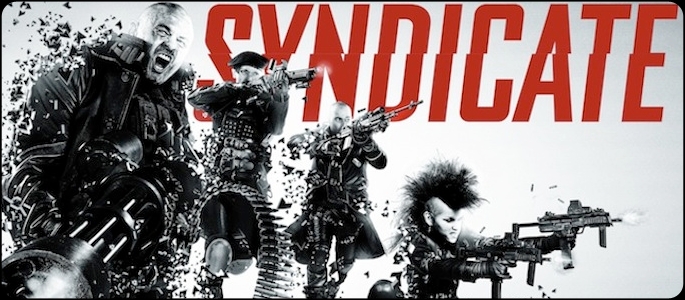Developer Starbreeze is behind some of the most unique and interesting first-person shooters of the last several years. From the sleeper hit that was The Chronicles of Riddick: Escape from Butcher Bay to the horrifyingly disturbing The Darkness, the studio is just bursting with creativity. That is why it saddens me to report that Syndicate is by and large one of their least impressive titles to date, delivering an experience that, while somewhat unique in concept, comes across as tired and uninspired.
The universe of Syndicate is hands down the best thing the game has going for it. While the franchise initially got its start as an isometric real-time strategy game back in ’93, the futuristic cyber-punk world translates well into a first-person shooter. Unfortunately, the developers failed to really capitalize on everything the franchise has to offer. The game’s story jumps off to a deceptively intriguing start, as it fleshes out a future in which the world is ruled by massive corporations known as Syndicates. The biggest of these is EuroCorp and the game’s protagonist Kilo happens to be one of their most valuable employees, outfitted with a prototype chip that allows him to freely access the dataverse.
Without giving too much of the plot away, the player gets to experience the ins and outs of working for this corporation, which unsurprising packs its own set of twists and turns. Unfortunately, by the end of the shockingly short campaign (I finished it in well under ten hours) you’re not left with any real lasting sense of achievement or attachment to the experience. A handful of characters are fleshed out relatively well, but there is such a disconnect between the player and the main character that all the major reveals at the game’s conclusion pack a very weak emotional punch and end up landing flat. That said, the voice acting is solid and the character animations adequately serve their purpose.
Visually the game is a bit of a mixed bag, as Syndicate aims to create a futuristic world that is still somewhat grounded in reality, but in the end is plagued by its overly sterile style. Even though the single player campaign took me a little over five hours to complete, I was already tired of the experience mainly because of the game’s generic environments that all looked far too similar. On the other hand, the dynamic use of lighting adds quite a bit to the visual package, though at times it overstays its welcome. On one particular occasion I found myself squinting for minutes on end because I had entered a brightly lit room that obscured my character’s vision. While this does add a level of immersion to the experience, giving me a headache in the process is never a good thing.

Oh, so bright!
As I mentioned earlier, Kilo has a special chip – known as the DART 6 – implanted into his brain which allows him to “connect” with the electronic world around him. As such, there are always number and letters littered across the screen as you survey the environment. While it is a cool visual touch, I found the clutter to be a bit distracting, especially when I was trying to take out enemies from a distance. It’s clear that Starbreeze went out of their way to really push the futuristic concept to the fullest, rendering an experience that feels immersive only some of the time.
Unfortunately, Syndicate’s gameplay, while polished and functional, suffers the same fate. The first-person shooter genre has been done to death this generation, so the bar is ridiculously high for any game that enters this playing field. A “scanning” mechanic accompanies the shooting to add a bit of variety, but ends up feeling more like a chore rather than a break from the action. On a number of occasions I would find myself scouring a room for several minutes after wiping out all the enemies in search of the thing I needed to scan so I could progress to the next area. I found these moments to be incredibly frustrating, especially considering the fact that you are not provided with any sort of map or glowing trail to steer you in the right direction.
To be fair though, it would be tough to make a solid case for including a map because of the game’s extreme linearity. There is virtually nothing to explore as the game funnels you from one room to the next. Bearing this in mind, you can understand my frustration in being locked in a room full of dead enemies unable to do much more than look around for a switch to flip or a terminal to scan. There were also a couple of instances in which you need to do a bit of platforming, which I also found slightly aggravating. I’m sorry, but unless I’m playing Mirror’s Edge I don’t want to have to worry about timing my jumps in first-person.
As one might expect from a Starbreeze FPS, the shooting mechanics are smooth and satisfying. When I first jumped into the game, I must admit I thought they felt a bit loose, but after acclimating myself to the game’s responsiveness and speed, it played quite well. As far as weapons go, there’s a fair assortment of guns, including an array of smaller firearms as well as your standard assault and sniper rifles. The fact that there aren’t all too many incredibly unique weapons is a bit disappointing, especially in a post Resistance era. They could have taken the whole futuristic warfare to new heights with the weaponry, but instead settled with an arsenal that offers little creativity and rests upon the stereotypes of futuristic weaponry. That said, I did feel pretty powerful the first time I tore through a crowd of unsuspecting enemies with the mini-gun.

Eat lead!!!
While the weapons themselves don’t offer anything all that original, Syndicate does add a unique twist to the genre by including three different abilities that your tech-powered character learns over the course of the game. These powers allow you to manipulate the minds of your enemies, forcing them to stumble and drop their weapons, commit suicide or turn on their teammates before offing themselves. While there are only just these few and they all sort of blend together after a while, I must admit, it did offer a sort of sick sense of satisfaction right off the bat. In order to make use of these abilities, you have to perform well in firefights by racking up kills, head shots and the like, which adds a delightful sense of reward for your precision and skill.
Additionally, at the press of a button you can enter an adrenaline-filled mode where enemies are illuminated in orange and everything slows down à la F.E.A.R. You can only stay in this mode for a few seconds after having to wait for it to recharge, so it has to be used sparingly. Throughout the course of the single player campaign you’ll face off against a number of “boss” enemies in encounters that I didn’t find all that compelling. Aside from having a larger health bar and an added ability or two, they don’t feel all that different from the rest of the game’s adversaries. However, upon defeating one of these ‘villains’, you are able to extract a chip from their brain through a rather invasive and grotesque process I will not describe, which allows you to level up your character by upgrading one of Kilo’s stats and/or skills. It’s not incredibly complex, but it does help to add that extra bit of customizability to an otherwise generic first-person shooter.

In through the ear and into the brain…
And then there’s co-op. I’ve never been a huge fan of cooperative modes in games and Syndicate certainly hasn’t converted me. Don’t get me wrong, the mode is fully functional and allows you to play with up to three of your friends over the PlayStation Network, it just doesn’t do anything revolutionary that will draw gamers in who don’t already dig this style of play. After being grouped up in the game’s smooth matchmaking lobby, you and your team will embark on a series of objective based missions completely separate from the main story. Considering the wide range of choices when it comes to cooperatives shooters, there isn’t a whole lot here to pull you away from your former franchise of choice, but what might lure a few gamers in is the level of customizability. Much like in the single player, you can upgrade your character as you level up and work together, unlocking content that will keep tempting you to come back for more. So while it’s not going to be an Earth-shattering experience for most, the co-op does offer plenty of content for those looking to kill some time with their friends.
In the end, I was left feeling a bit unsatisfied with Syndicate, but at the same time, I didn’t completely regret the time I spent in its corporate-run future. I typically don’t mind short campaigns, but an experience just over 5 hours that doesn’t leave you wanting more is certainly not a good thing. As a whole, Syndicate is a functional shooter that employs some interesting concepts but fails to really flesh them out to their fullest. If you find the universe compelling and like FPS’s with a futuristic twist, I’d wait until this one reaches the bargain bin.
PlayStation LifeStyle’s Final Score
+/- Interesting universe with unrealized potential – Incredibly short single player that doesn’t leave you wanting more |
 |








